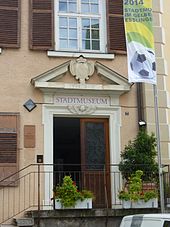Christian Fink
Christian Fink (born August 3, 1831 in Dettingen , † September 4, 1911 in Eßlingen am Neckar ) was a German musician, composer and teacher.
Life
Christian Fink was the son of a schoolmaster from Dettingen near Heidenheim . His brother Friedrich Fink was born ten years after him . In 1846 Christian Fink received a teacher training course at the Stuttgart orphanage. He learned to play the organ from Conrad Kocher . After having been a music assistant at the Esslingen teachers' college from 1849, he was able to study music in Leipzig and Dresden from 1853 to 1855 thanks to a foundation from Queen Olga . His teachers included Ernst Friedrich Richter and Johannes Schneider (organ), Ignaz Moscheles (piano) and Moritz Hauptmann (theory). Franz Liszt expressed his appreciation for Fink. After completing his studies, he temporarily returned to Württemberg and initially lived as a private music teacher and as a companion of the Riedel Society in Leipzig. He participated in the world premiere of Liszt's festival mass in Gran.
In 1860 he was appointed to succeed Johann Georg Frech as music teacher at the Esslingen teachers' seminar and as music director at the St. Dionys town church (Esslingen am Neckar) . In 1861 he became the choirmaster of the Esslinger Liederkranz; In 1862 he received the title of professor. From 1863 he was also the music director of the Oratorio Society. After Fink's festive salute for four-part male choir had already been performed in 1861 on the occasion of the 50th anniversary of the teacher’s seminar, a cantata was performed in 1868 to mark the 50th anniversary of the city museum. In 1869 Fink resigned as head of the song wreath. In 1879 A. Hänlein first performed his organ sonata op. 1 at the Tonkünstlerfest in Wiesbaden . In 1885, on the occasion of his 25th anniversary in service, Fink received the large gold medal for art and science on the ribbon of the Order of the Württemberg Crown. In 1891 he became an honorary member of the Protestant church choir.
In 1900, on the occasion of his 40th anniversary in service, he was decorated with the First Class Knight's Cross of the Order of Frederick , two years later he ended his activity as head of the oratorio association. In 1904 he also gave up the activity as city church cantor and organist and in 1905 he was retired from the teachers' college.
Posthumous appreciation
On the occasion of his 100th birthday, two anniversary celebrations were held in 1931, at which only compositions by Fink could be heard. A CD with Christian Fink's organ works was released in 2001. A concert was also given on the occasion of the 100th anniversary of his death. In 2018 the pianist Robert Bärwald released a CD with songs and piano works by Fink.
Works
- Vocal works
op. 49: Four songs with organ,
op. 51: Four songs with organ
- Organ works
opp. 1–83: Five organ sonata
op. 93: Eight chorale preludes:
No. 1 How beautifully the morning star shines
No. 2 Bridegroom
No. 4 Should it shine from time to time
No. 5 Thank God in all the world
No. 6 Oh what am I supposed to be a sinner Make
No. 7 Preserve us Lord by Your Word
No. 8 Who knows how near my end is to me
- Piano works
op.11: Sonata No.1 in A major op.21
: Sonata No.2 in E flat major
family
Christian Fink married Rosa Pauline Karoline Schreiber (1847–1911), a daughter of Jakob Friedrich Ferdinand Schreiber , on May 1, 1869 , for whom he composed many songs. The three daughters Rosa Helene , Maria Johanna and Eugenie Elisabeth were born between 1870 and 1872, son Max Gustav followed in 1875, but died at the age of a few months. From the marriage of the eldest daughter to the glove manufacturer Ernst Schimpf, the son Hans Friedrich Wilhelm Schimpf emerged in 1897 , and in 1898 the daughter Elisabeth Eugenie Rosa, called Lilli. Hans Schimpf became corvette captain, specialist in radio reconnaissance, most recently head of the research office (an intelligence service) and died in 1935 under mysterious circumstances. He left a widow and four children, including his son Rolf, who was born in 1924 . Fink's estate is in the Esslingen City Archives .
literature
- Frithjof Vollmer: Christian Fink (1831–1911) . In: Rainer Bayreuther / Nikolai Ott (eds.): Choir composers in Württemberg , Esslingen a. a .: Helbling 2019, ISBN 9783862274185 , pp. 120-131.
Web links
- Biographical information and catalog raisonné
- Christian Fink on the website www.schwaebische-orgelromantik.de with a portrait and a list of all known organ works.
- Sheet music and audio files by Christian Fink in the International Music Score Library Project
- The best organ virtuoso of his time In: Stuttgarter Zeitung , January 9, 2019, accessed on January 11, 2019.
Individual evidence
- ↑ Klassika.info
- ↑ jpc.de
- ↑ evang-kirche-oberesslingen.de ( Memento of the original from March 4, 2016 in the Internet Archive ) Info: The archive link was inserted automatically and has not yet been checked. Please check the original and archive link according to the instructions and then remove this notice.
- ↑ [1]
- ↑ Swabian organ romanticism
- ↑ OCLC 71484912 ; OCLC 1006774725
- ↑ OCLC 1006773487
- ↑ orgelbau-lenter.de (PDF; 4.0 MB)
- ↑ Margarete Siegele: Rosa Helene Schimpf born. Fink (1870-1949). An upper class life . In: Women's Commissioner of the City of Esslingen am Neckar (ed.): Women. Fates. Careers. Vocations. 1850-1950 . Esslingen 2005, ISBN 3-9809328-8-5 , pp. 22-33
- ↑ archive-bw.de
| personal data | |
|---|---|
| SURNAME | Fink, Christian |
| BRIEF DESCRIPTION | German organist, choir director and composer |
| DATE OF BIRTH | August 3, 1831 |
| PLACE OF BIRTH | Dettingen am Albuch |
| DATE OF DEATH | September 4, 1911 |
| Place of death | Esslingen am Neckar |

